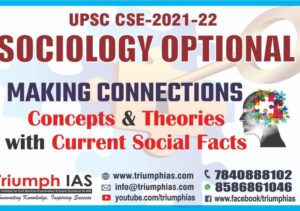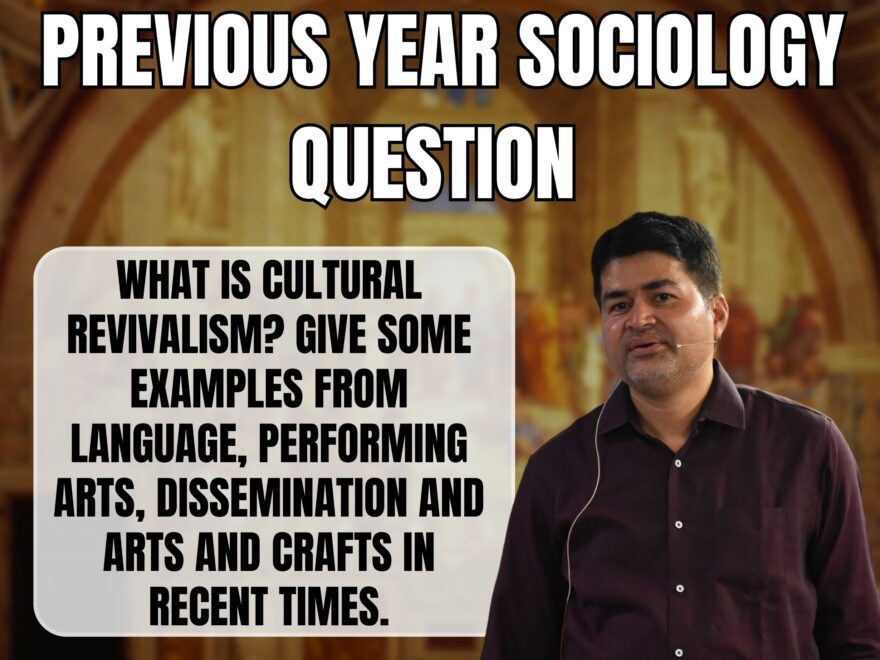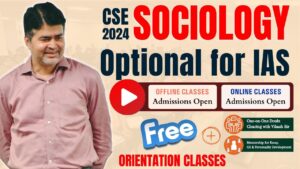What is Cultural Revivalism? Give some examples from language, performing arts, dissemination and arts and crafts in recent times.
Section: B
Sociology Paper 2017
(Relevant for Sociology Optional for Civil Services Examination)
Paper 2: Unit 13 Social Changes in India; Challenges of Social Transformation
Question: What is Cultural Revivalism? Give some examples from language, performing arts, dissemination and arts and crafts in recent times.
– 20 Marks
Introduction: Definition of Cultural RevivalismMain Body: Examples of Cultural Revivalism in India, Challenges Associated With Cultural RevivalismConclusion: Blend of Modernity And Cultural Revivalism |
Introduction
Cultural revivalism refers to the resurgence, preservation, and promotion of traditional Indian cultural elements that may have experienced a decline or suppression, often due to colonization, modernization, or other socio-political factors.
Main Body:
Here are some examples of cultural revivalism in India in recent times across various domains:
- Language: Schedules 8 of Indian Constitution safeguard various languages and efforts are being done to safeguard Indian heritage language. Apart from it the recent focus on vernacular language in NATIONAL EDUACTION POLICY also highlights importance of linguistic abilities.
- Performing Arts:
- Classical Dance Revival: Various classical Indian dance forms, such as Bharatanatyam, Kathak, Odissi, and Kuchipudi, have experienced a resurgence in popularity, with increased interest both within India and internationally.
- Traditional Music: Ancient musical traditions like Hindustani and Carnatic music continue to thrive, with musicians working to preserve and promote these art forms.
- Dissemination:
- Indian Film and Television: Indian cinema and television have played a significant role in disseminating traditional cultural values, languages, and stories through movies and serials. Recent movies like Kanatra shows traditional folk and its significance.
- Arts and Crafts:
- Handicrafts and Handlooms: Various Indian states have promoted their traditional handicrafts and handloom industries, such as Banarasi silk, Pashmina shawls, and Madhubani painting, to preserve these artisanal skills and provide livelihoods to artisans. The traditional arts and sculptures are given Geographical Indications by government. Hence, Legal rational authority is safeguarding the little tradition .
- Tribal Art Forms: Indigenous tribal communities in India have been encouraged to continue their traditional art forms, like Warli painting and Gond art, through workshops and exhibitions. TRIFED is working to promote and revival of the tribal arts. It highlights the balanced approach for solving the problem of integration and autonomy of tribes. .
- Festivals and Celebrations:
-
- Navratri celebrations in Gujarat, particularly the Garba and Dandiya dance forms, have grown in popularity, attracting participants from various backgrounds. Such instances show the process of universalization and parochialization process taking place.
- Traditional Medicine and Healing Practices:
- Ayurveda and Yoga: Ayurveda, an ancient system of medicine, and yoga have seen a resurgence in interest globally, with many seeking holistic wellness through these traditional practices.
- Cultural Heritage Conservation:
- Historical Sites and Monuments: India has undertaken extensive efforts to preserve and restore its historical sites and monuments, such as the restoration of temples, forts, and palaces.
Challenges associated with cultural revivalism
- Cultural Appropriation: In the process of revival, there is a risk that elements of a culture may be appropriated by outsiders without understanding or respecting their significance. This can lead to the commercialization of cultural practices or the distortion of their meaning.
- Conservatism and Resistance to Change: Cultural revivalism may sometimes be accompanied by a conservative attitude that resists adaptation to modern contexts or new ideas..
- Conflict and Competition: In multicultural societies, the revival of one culture’s traditions may sometimes be viewed as a threat by other cultural groups, leading to conflicts or competition for resources and recognition.
- Globalization and Homogenization: The forces of globalization can erode traditional cultural practices and values. Cultural revivalism may struggle to counter the pervasive influence of global mass media, consumerism, and Westernization.
- Political and Ideological Manipulation: Cultural revivalism can be manipulated for political or ideological purposes, leading to a distorted representation of culture or the exclusion of certain groups within a culture.
- Ethnic Nationalism: In some cases, cultural revivalism can be linked to ethnic nationalism, which may lead to exclusionary and divisive practices and conflicts with other groups.
Conclusion
Culture’s definition should evolve through a democratic, generational dialogue, free from romanticized or distorted past narratives. Embracing the contemporary context is vital for progress, ensuring we move forward and not relive history alongside safeguarding our unique cultural traditions.
Related Blogs …
 |
 |

To master these intricacies and fare well in the Sociology Optional Syllabus, aspiring sociologists might benefit from guidance by the Best Sociology Optional Teacher and participation in the Best Sociology Optional Coaching. These avenues provide comprehensive assistance, ensuring a solid understanding of sociology’s diverse methodologies and techniques.
META TAGS:
Cultural Revivalism, Cultural Revivalism upsc, Cultural Revivalism in India, Indian Culture, Traditional Arts, Language Preservation, Performing Arts, Dissemination of Culture, Handicrafts, Tribal Art Forms, Traditional Medicine, Cultural Heritage Conservation, National Education Policy, Vernacular Language, Classical Dance, Traditional Music, Indian Film, Handlooms, Geographical Indications, TRIFED, Navratri, Ayurveda, Yoga, Challenges, Cultural Appropriation, Conservatism, Globalization, Ethnic Nationalism, Modernity and Tradition, Cultural Traditions, Social Challenges, Heritage Preservation, Social Integration, Societal Trends.
Why Vikash Ranjan’s Classes for Sociology?
Proper guidance and assistance are required to learn the skill of interlinking current happenings with the conventional topics. VIKASH RANJAN SIR at TRIUMPH IAS guides students according to the Recent Trends of UPSC, making him the Best Sociology Teacher for Sociology Optional UPSC.
At Triumph IAS, the Best Sociology Optional Coaching platform, we not only provide the best study material and applied classes for Sociology for IAS but also conduct regular assignments and class tests to assess candidates’ writing skills and understanding of the subject.
Choose The Best Sociology Optional Teacher for IAS Preparation?
At the beginning of the journey for Civil Services Examination preparation, many students face a pivotal decision – selecting their optional subject. Questions such as “which optional subject is the best?” and “which optional subject is the most scoring?” frequently come to mind. Choosing the right optional subject, like choosing the best sociology optional teacher, is a subjective yet vital step that requires a thoughtful decision based on facts. A misstep in this crucial decision can indeed prove disastrous.
Ever since the exam pattern was revamped in 2013, the UPSC has eliminated the need for a second optional subject. Now, candidates have to choose only one optional subject for the UPSC Mains, which has two papers of 250 marks each. One of the compelling choices for many has been the sociology optional. However, it’s strongly advised to decide on your optional subject for mains well ahead of time to get sufficient time to complete the syllabus. After all, most students score similarly in General Studies Papers; it’s the score in the optional subject & essay that contributes significantly to the final selection.
“A sound strategy does not rely solely on the popular
Opinion of toppers or famous YouTubers cum teachers.”
It requires understanding one’s ability, interest, and the relevance of the subject, not just for the exam but also for life in general. Hence, when selecting the best sociology teacher, one must consider the usefulness of sociology optional coaching in General Studies, Essay, and Personality Test.
The choice of the optional subject should be based on objective criteria, such as the nature, scope, and size of the syllabus, uniformity and stability in the question pattern, relevance of the syllabic content in daily life in society, and the availability of study material and guidance. For example, choosing the best sociology optional coaching can ensure access to top-quality study materials and experienced teachers. Always remember, the approach of the UPSC optional subject differs from your academic studies of subjects. Therefore, before settling for sociology optional, you need to analyze the syllabus, previous years’ pattern, subject requirements (be it ideal, visionary, numerical, conceptual theoretical), and your comfort level with the subject.
This decision marks a critical point in your UPSC – CSE journey, potentially determining your success in a career in IAS/Civil Services. Therefore, it’s crucial to choose wisely, whether it’s the optional subject or the best sociology optional teacher. Always base your decision on accurate facts, and never let your emotional biases guide your choices. After all, the search for the best sociology optional coaching is about finding the perfect fit for your unique academic needs and aspirations.
Follow us:
🔎 https://www.instagram.com/triumphias
🔎https://www.youtube.com/c/TriumphIAS
🔎https://t.me/VikashRanjanSociology
Find More Blogs
| Compare and contrast Karl Marx’s and Max weber’s | Karl Marx- Historical Materialism |
| Talcott Parsons : Social system | Scope of the subject and comparison with other social sciences |




